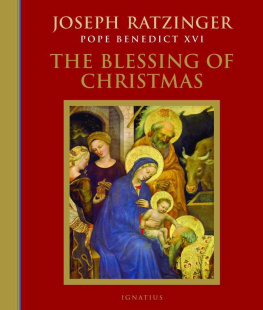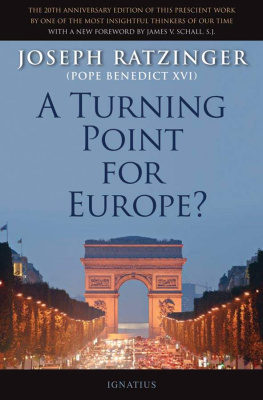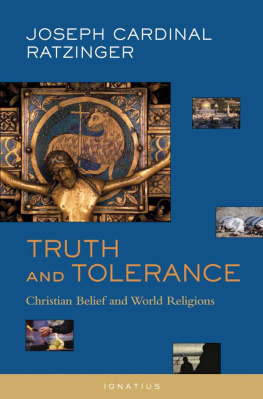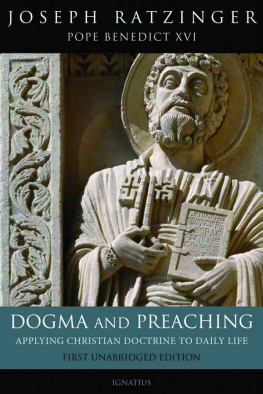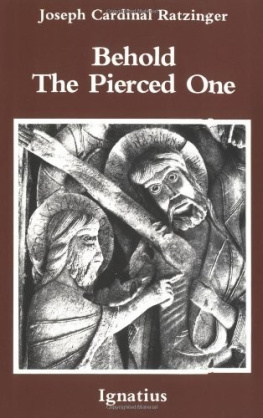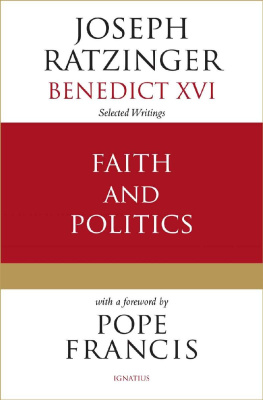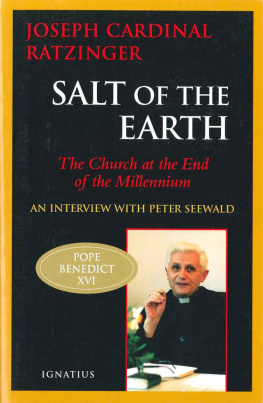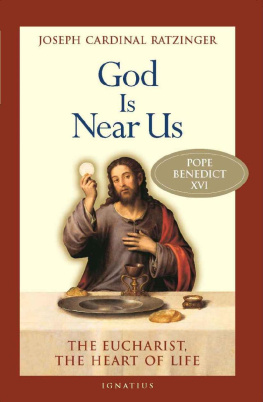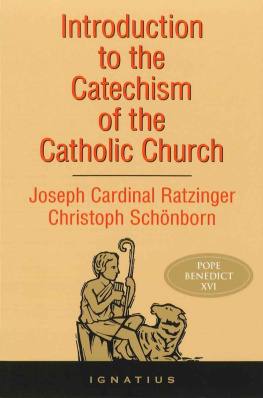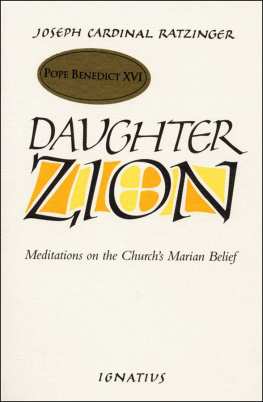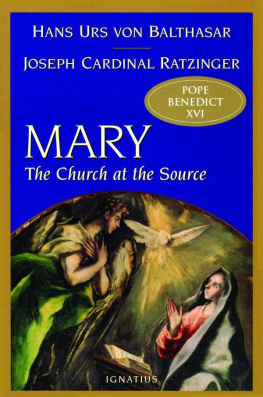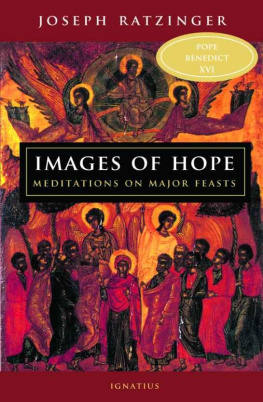Joseph Cardinal Ratzinger - The Blessing of Christmas
Here you can read online Joseph Cardinal Ratzinger - The Blessing of Christmas full text of the book (entire story) in english for free. Download pdf and epub, get meaning, cover and reviews about this ebook. year: 0, genre: Religion. Description of the work, (preface) as well as reviews are available. Best literature library LitArk.com created for fans of good reading and offers a wide selection of genres:
Romance novel
Science fiction
Adventure
Detective
Science
History
Home and family
Prose
Art
Politics
Computer
Non-fiction
Religion
Business
Children
Humor
Choose a favorite category and find really read worthwhile books. Enjoy immersion in the world of imagination, feel the emotions of the characters or learn something new for yourself, make an fascinating discovery.
- Book:The Blessing of Christmas
- Author:
- Genre:
- Year:0
- Rating:3 / 5
- Favourites:Add to favourites
- Your mark:
- 60
- 1
- 2
- 3
- 4
- 5
The Blessing of Christmas: summary, description and annotation
We offer to read an annotation, description, summary or preface (depends on what the author of the book "The Blessing of Christmas" wrote himself). If you haven't found the necessary information about the book — write in the comments, we will try to find it.
Joseph Cardinal Ratzinger: author's other books
Who wrote The Blessing of Christmas? Find out the surname, the name of the author of the book and a list of all author's works by series.
The Blessing of Christmas — read online for free the complete book (whole text) full work
Below is the text of the book, divided by pages. System saving the place of the last page read, allows you to conveniently read the book "The Blessing of Christmas" online for free, without having to search again every time where you left off. Put a bookmark, and you can go to the page where you finished reading at any time.
Font size:
Interval:
Bookmark:
The Blessing of Christmas
JOSEPH RATZINGER
(Pope Benedict XVI)
The Blessing of
Christmas
Translated by Brian McNeil
IGNATIUS PRESS SAN FRANCISCO
Chapter opening illustration: Book with the prophecy:
Behold, a virgin shall conceive
and bear a son, and shall call his name Immanuel (Is 7:14).
A detail from the scene of the Annunciation
on the Isenheim altar by Matthias Grnewald.
Colmar, Museum Unterlinden
Original German edition:
Der Segen der Weihnacht: Meditationen
2005 by Libreria Editrice Vaticana, Vatican City
2005 by Verlag Herder, Freiburg im Breisgau
Cover art:
Adoration of the Magi (detail)
Gentile da Fabriano (1385-1427)
Uffizi, Florence, Italy
Erich Lessing / Art Resource, New York
Cover design by Roxanne Mei Lum
Libreria Editrice Vaticana
1986, 2007 by Ignatius Press, San Francisco
All rights reserved
ISBN 978-1-58617-172-8
Library of Congress Control Number 2006939357
Contents

Christ, the center of history: Cupola mosaic, ca. 1320.
Istanbul, Chora Monastery
Preface
T his book brings together in one volume two earlier books by Joseph Ratzinger that perfectly complement each other: Licht, das uns leuchtet (The light that shines upon us; 1978) and Lob der Weihnacht (Praise of Christmas; 1982, by Cardinal Ratzinger and Heinrich Schlier). Most of these meditations were written during Cardinal Ratzingers time as Archbishop of Munich. They were composed for a general public in the form of sermons, radio addresses, or newspaper articles.
These two volumes were very popular but have long been out of print. They are republished here in a single volume. They show Joseph Ratzinger, now Pope Benedict XVI, as a spiritual man who knows how to address both mind and heart.
Freiburg, July 2005
Verlag Herder
From the Authors Foreword to
Lob der Weihnacht
(Praise of Christmas)
T he meditations presented in this short book were written on various occasions during Advent and Christmastide of 1977. I am grateful to Verlag Herder for suggesting that they should be gathered together and published in this form. They have one aim: to awaken that internal act of seeing which can perceive the truth in the words of Scripture: The goodness and loving kindness of God our Savior [has] appeared to us (Tit 3:4).
From the Authors Foreword to
Licht, das uns leuchtet
(The light that shines upon us)
F rom a theological point of view, Easter is the center of the Church year; but Christmas is the most profoundly human feast of faith, because it allows us to feel most deeply the humanity of God. The crib has a unique power to show us what it means to say that God wished to be Immanuela God with us, a God whom we may address in intimate language, because he encounters us as a child. This makes Christmas a feast that invites us in a special way to meditation, to an internal act of looking at the Word (cf. Lk 1:29; 2:19; 2:51).

Melozzo da Forli (1438-1494): The angel of the Annunciation .
Florence, Uffizi
1
At the Beginning of Advent:
An Advent Dialogue with the Sick

W hen the quiet joy of the period before Christmas makes itself felt on every side, many factors can make it especially hard to be sick. The burden of sickness prevents us from truly sharing in the joy others feel. But perhaps Advent can nevertheless become a medicine of the soul that makes it easier to bear the enforced inaction and the pain of your illness. Indeed, perhaps Advent can help us discover the unobtrusive grace that can lie in the very fact of being sick.

Roger van der Weyden (ca. 1400-1464): The Visitation. The encounter between Mary and Elizabeth, who both expect a child.
Leipzig, Museum of Fine Arts
A very personal Advent of ones own
Let us reflect on what the word Advent actually means. The Latin word adventus can be translated as presence or arrival. In the vocabulary of classical antiquity, it was a technical term for the arrival of a high official and especially for the arrival of kings or emperors in a province. It could, however, also express the arrival of a deity who emerged from hiddenness and gave proof of his presence through mighty works or of a god whose presence was solemnly celebrated in a cultic act.
The Christians adopted this word in order to express their special relationship to Jesus Christ. For Christians, he was the king who had entered this wretched province Earth and bestowed on it the gift of his visit; and they believed that he was present in the liturgical assembly. In general terms, when they used this word, they intended to say: God is here. He has not withdrawn from the world. He has not left us alone. Although we cannot see him and take hold of him as we do with objects in this world, nevertheless he is here, and he comes to us in many ways.
Accordingly, the word visitatio is closely connected to the meaning of the word Advent. This means visit, but our ecclesiastical language has long been accustomed to translate it as visitation. And a strange shift in our thinking has occurred here: the word visitation has almost completely lost the joyful contents of the word visit. We no longer think of its original meaning; rather, we think of visitations as burdens and labors that we interpret as a punishment visited upon us by God. But the opposite ought in fact to be the case! The word visitation (or visit) ought to help us perceive that even hard things may contain something of the beauty of Advent.
Just like a great joy, so too illness and suffering can be a very personal Advent of ones owna visit by the God who enters my life and wants to encounter me personally. Even when it is difficult for us, we should at least try to understand the days of our illness in this way: The Lord has interrupted my activity for a time in order to let me be still.
In my daily living, I have little time for him and little time for myself. I am completely involved from morning to evening in all the things I have to do, and I even succeed in eluding my own grasp, because I do not know how to be alone with myself. My job possesses me; the society in which I live possesses me; entertainment of various kinds possesses me; but I do not possess myself. And this means that I gradually go to seed like an overgrown garden, first in my external activities and, then, in my inner life, too. I am propelled along by my activities, for I am merely a cog in their great machinery.
But now God has drawn me out of all this. I am obliged to be still. I am obliged to wait. I am obliged to reflect on myself; I am obliged to bear being alone. I am obliged to bear pain, and I am obliged to accept the burden of my own self. All this is hard.
But may it not be the case that God is waiting for me in this stillness? May it not be the case that he is doing here what Jesus says in the parable of the vine: Every branch that does bear fruit he prunes, that it may bear more fruit (Jn 15:2)?
If I learn to accept myself in these days of stillness, if I accept the pain, because the Lord is using it to purify medoes this not make me richer than if I had earned a lot of money? Has not something happened to me that is more durable and fruitful than all those things that can be counted and calculated?
Next pageFont size:
Interval:
Bookmark:
Similar books «The Blessing of Christmas»
Look at similar books to The Blessing of Christmas. We have selected literature similar in name and meaning in the hope of providing readers with more options to find new, interesting, not yet read works.
Discussion, reviews of the book The Blessing of Christmas and just readers' own opinions. Leave your comments, write what you think about the work, its meaning or the main characters. Specify what exactly you liked and what you didn't like, and why you think so.

